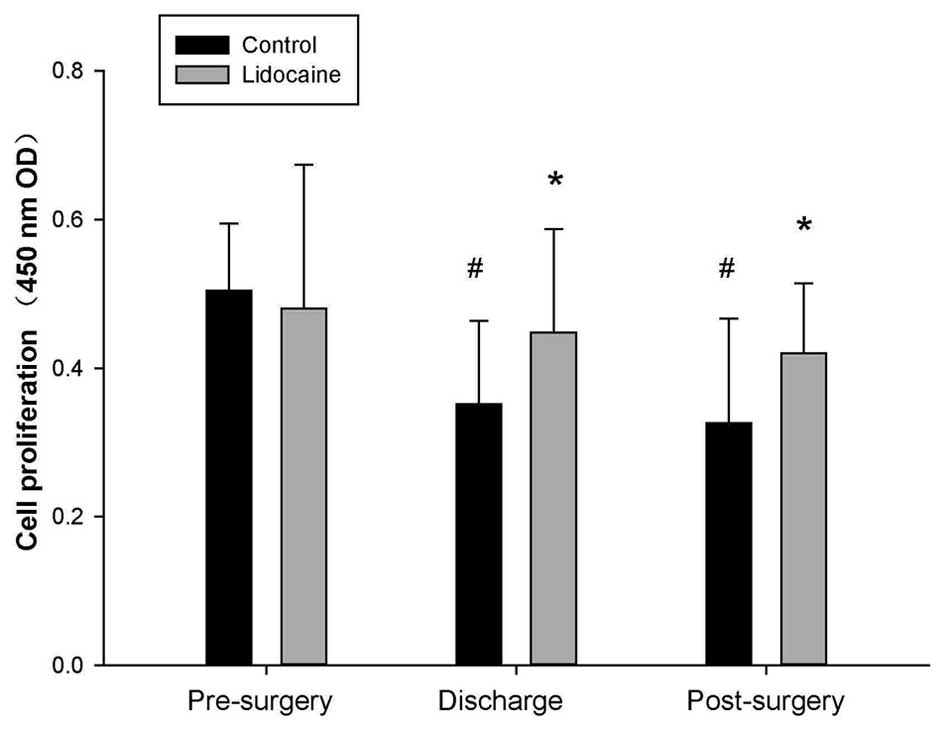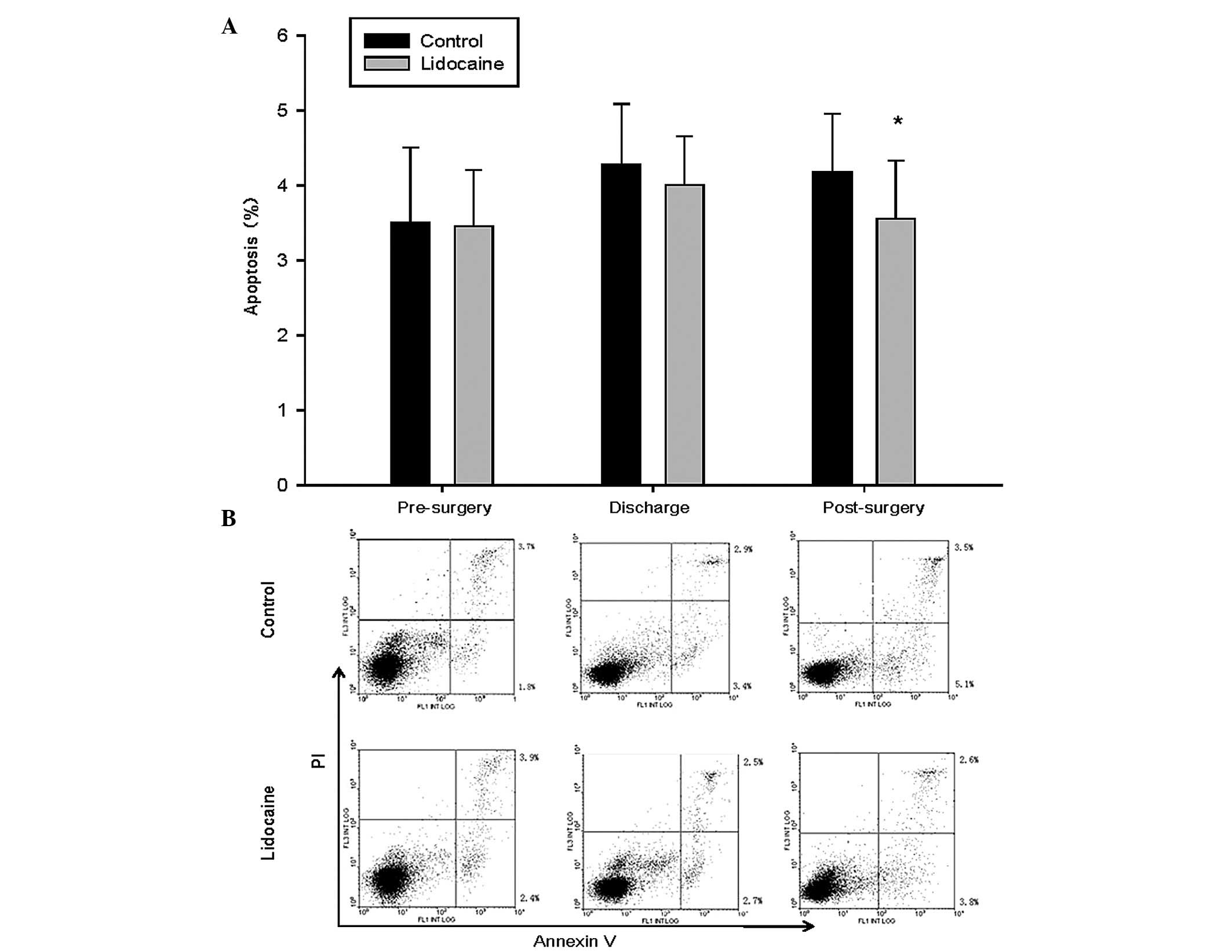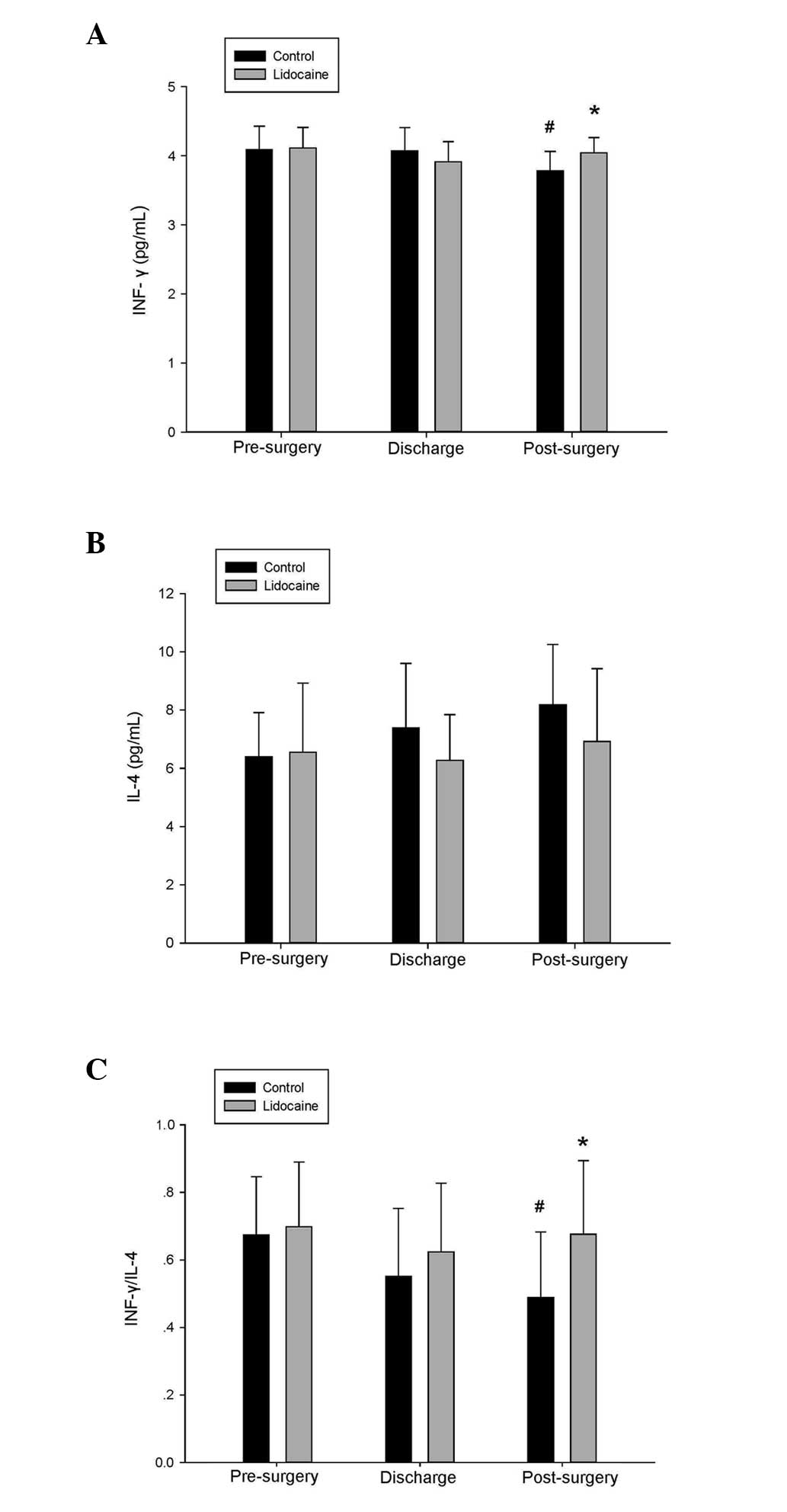|
1
|
Hogan BV, Peter MB, Shenoy HG, Horgan K
and Hughes TA: Surgery induced immunosuppression. Surgeon. 9:38–43.
2011. View Article : Google Scholar : PubMed/NCBI
|
|
2
|
Ogawa K, Hirai M, Katsube T, Murayama M,
Hamaguchi K, Shimakawa T, Naritake Y, Hosokawa T and Kajiwara T:
Suppression of cellular immunity by surgical stress. Surgery.
127:329–336. 2000. View Article : Google Scholar : PubMed/NCBI
|
|
3
|
Ishikawa M, Nishioka M, Hanaki N, Miyauchi
T, Kashiwagi Y, Ioki H, Kagawa A and Nakamura Y: Perioperative
immune responses in cancer patients undergoing digestive surgeries.
World J Surg Oncol. 7:72009. View Article : Google Scholar : PubMed/NCBI
|
|
4
|
Delogu G, Moretti S, Antonucci A,
Marcellini S, Masciangelo R, Famularo G, Signore L and De Simone C:
Apoptosis and surgical trauma: Dysregulated expression of death and
survival factors on peripheral lymphocytes. Arch Surg.
135:1141–1147. 2000. View Article : Google Scholar : PubMed/NCBI
|
|
5
|
Papadima A, Boutsikou M, Lagoudianakis EE,
Kataki A, Konstadoulakis M, Georgiou L, Katergiannakis V and
Manouras A: Lymphocyte apoptosis after major abdominal surgery is
not influenced by anesthetic technique: A comparative study of
general anesthesia versus combined general and epidural analgesia.
J Clin Anesth. 21:414–421. 2009. View Article : Google Scholar : PubMed/NCBI
|
|
6
|
Hollmann MW and Durieux ME: Local
anesthetics and the inflammatory response: A new therapeutic
indication? Anesthesiology. 93:858–875. 2000. View Article : Google Scholar : PubMed/NCBI
|
|
7
|
Gallos G, Jones DR, Nasr SH, Emala CW and
Lee HT: Local anesthetics reduce mortality and protect against
renal and hepatic dysfunction in murine septic peritonitis.
Anesthesiology. 101:902–911. 2004. View Article : Google Scholar : PubMed/NCBI
|
|
8
|
Wang HL, Zhang WH, Lei WF, Zhou CQ and Ye
T: The inhibitory effect of lidocaine on the release of high
mobility group box 1 in lipopolysaccharide-stimulated macrophages.
Anesth Analg. 112:839–844. 2011. View Article : Google Scholar : PubMed/NCBI
|
|
9
|
Wang HL, Xing YQ, Xu YX, Rong F, Lei WF
and Zhang WH: The protective effect of lidocaine on septic rats via
the inhibition of high mobility group box 1 expression and NF-κB
activation. Mediators Inflamm. 2013:5703702013. View Article : Google Scholar
|
|
10
|
Yardeni IZ, Beilin B, Mayburd E, Levinson
Y and Bessler H: The effect of perioperative intravenous lidocaine
on postoperative pain and immune function. Anesth Analg.
109:1464–1469. 2009. View Article : Google Scholar : PubMed/NCBI
|
|
11
|
Farag E, Ghobrial M, Sessler DI, Dalton
JE, Liu J, Lee JH, Zaky S, Benzel E, Bingaman W and Kurz A: Effect
of peri-operative intravenous lidocaine administration on pain,
opioid consumption and quality of life after complex spine surgery.
Anesthesiology. 119:932–940. 2013. View Article : Google Scholar : PubMed/NCBI
|
|
12
|
Yon JH, Choi GJ, Kang H, Park JM and Yang
HS: Intraoperative systemic lidocaine for pre-emptive analgesics in
subtotal gastrectomy: A prospective, randomized, double-blind,
placebo-controlled study. Can J Surg. 57:175–182. 2014. View Article : Google Scholar : PubMed/NCBI
|
|
13
|
Fitz-Henry J: The ASA classification and
peri-operative risk. Ann R Coll Surg Engl. 93:185–187. 2011.
View Article : Google Scholar : PubMed/NCBI
|
|
14
|
Goldfarb Y, Sorski L, Benish M, Levi B,
Melamed R and Ben-Eliyahu S: Improving postoperative immune status
and resistance to cancer metastasis: A combined perioperative
approach of immunostimulation and prevention of excessive surgical
stress responses. Ann Surg. 253:798–810. 2011. View Article : Google Scholar : PubMed/NCBI
|
|
15
|
Glasner A, Avraham R, Rosenne E, Benish M,
Zmora O, Shemer S, Meiboom H and Ben-Eliyahu S: Improving survival
rates in two models of spontaneous postoperative metastasis in mice
by combined administration of a beta-adrenergic antagonist and a
cyclooxygenase-2 inhibitor. J Immunol. 184:2449–2457. 2010.
View Article : Google Scholar : PubMed/NCBI
|
|
16
|
Neeman E and Ben-Eliyahu S: Surgery and
stress promote cancer metastasis: New outlooks on perioperative
mediating mechanisms and immune involvement. Brain Behav Immun.
30(Suppl): S32–S40. 2013. View Article : Google Scholar
|
|
17
|
Lahat A, Ben-Horin S, Lang A, Fudim E,
Picard O and Chowers Y: Lidocaine down-regulates nuclear
factor-kappaB signalling and inhibits cytokine production and T
cell proliferation. Clin Exp Immunol. 152:320–327. 2008. View Article : Google Scholar : PubMed/NCBI
|
|
18
|
Kawasaki T, Kawasaki C, Sata T and Chaudry
IH: Lidocaine suppresses mouse Peyer's Patch T cell functions and
induces bacterial translocation. Surgery. 149:106–113. 2011.
View Article : Google Scholar
|
|
19
|
Werdehausen R, Braun S, Essmann F,
Schulze-Osthoff K, Walczak H, Lipfert P and Stevens MF: Lidocaine
induces apoptosis via the mitochondrial pathway independently of
death receptor signaling. Anesthesiology. 107:136–143. 2007.
View Article : Google Scholar : PubMed/NCBI
|
|
20
|
Boselli E, Duflo F, Debon R, Allaouchiche
B, Chassard D, Thomas L and Portoukalian J: The induction of
apoptosis by local anesthetics: A comparison between lidocaine and
ropivacaine. Anesth Analg. 96:755–756. 2003. View Article : Google Scholar : PubMed/NCBI
|
|
21
|
Decker D, Schondorf M, Bidlingmaier F,
Hirner A and von Ruecker AA: Surgical stress induces a shift in the
type-1/type-2 T-helper cell balance, suggesting down-regulation of
cell-mediated and up-regulation of antibody-mediated immunity
commensurate to the trauma. Surgery. 119:316–325. 1996. View Article : Google Scholar : PubMed/NCBI
|
|
22
|
Wang H, Ward MF and Sama AE: Targeting
HMGB1 in the treatment of sepsis. Expert Opin Ther Targets.
18:257–268. 2014. View Article : Google Scholar : PubMed/NCBI
|
|
23
|
Tang D, Kang R, Zeh HJ III and Lotze MT:
High-mobility group box 1 and cancer. Biochim Biophys Acta.
1799:131–140. 2010. View Article : Google Scholar : PubMed/NCBI
|
|
24
|
Tsujii S, Okabayashi T, Shiga M, Takezaki
Y, Sugimoto T, Kobayashi M and Hanazaki K: The effect of the
neutrophil elastase inhibitor sivelestat on early injury after
liver resection. World J Surg. 36:1122–1127. 2012. View Article : Google Scholar : PubMed/NCBI
|
|
25
|
Hasegawa A, Iwasaka H, Hagiwara S, Koga H,
Hasegawa R, Kudo K, Kusaka J and Noguchi T: Anti-inflammatory
effects of perioperative intensive insulin therapy during cardiac
surgery with cardiopulmonary bypass. Surg Today. 41:1385–1390.
2011. View Article : Google Scholar : PubMed/NCBI
|
|
26
|
El-Tahan MR, Warda OM, Diab DG, Ramzy EA
and Matter MK: A randomized study of the effects of perioperative
i.v. lidocaine on hemodynamic and hormonal responses for cesarean
section. J Anesth. 23:215–221. 2009. View Article : Google Scholar : PubMed/NCBI
|
|
27
|
Palacios R and Sugawara I: Hydrocortisone
abrogates proliferation of T cells in autologous mixed lymphocyte
reaction by rendering the interleukin-2 Producer T cells
unresponsive to interleukin-1 and unable to synthesize the T-cell
growth factor. Scand J Immunol. 15:25–31. 1982. View Article : Google Scholar : PubMed/NCBI
|


















